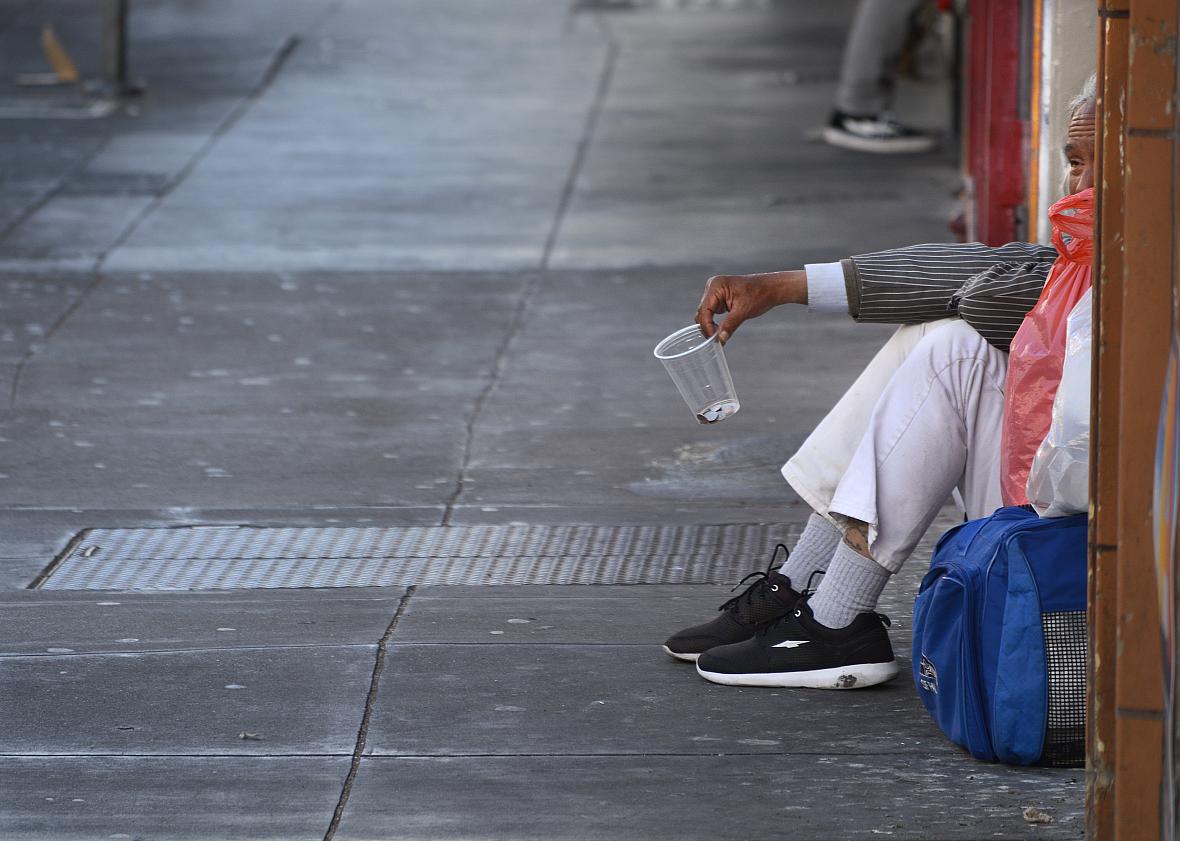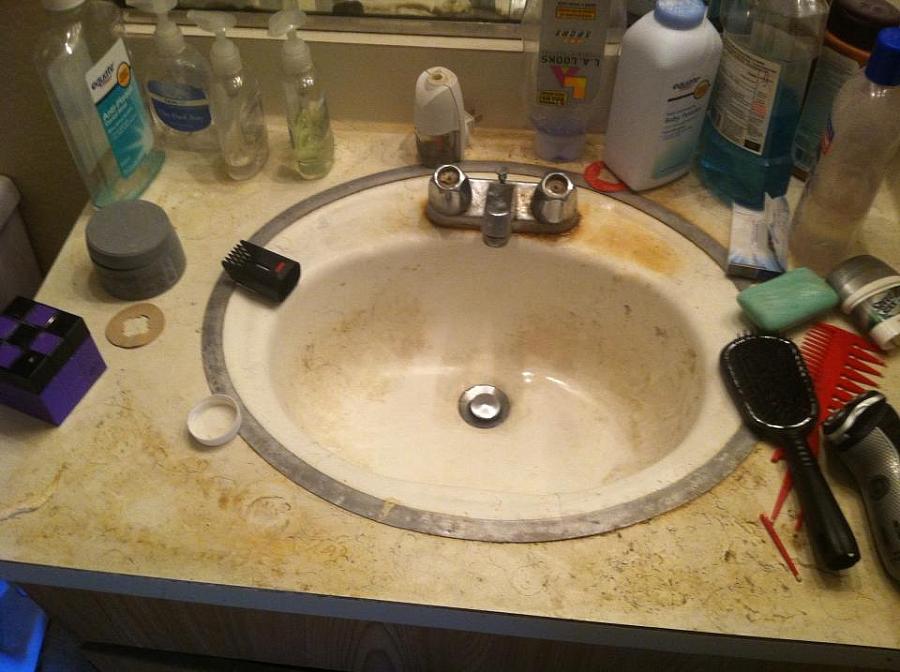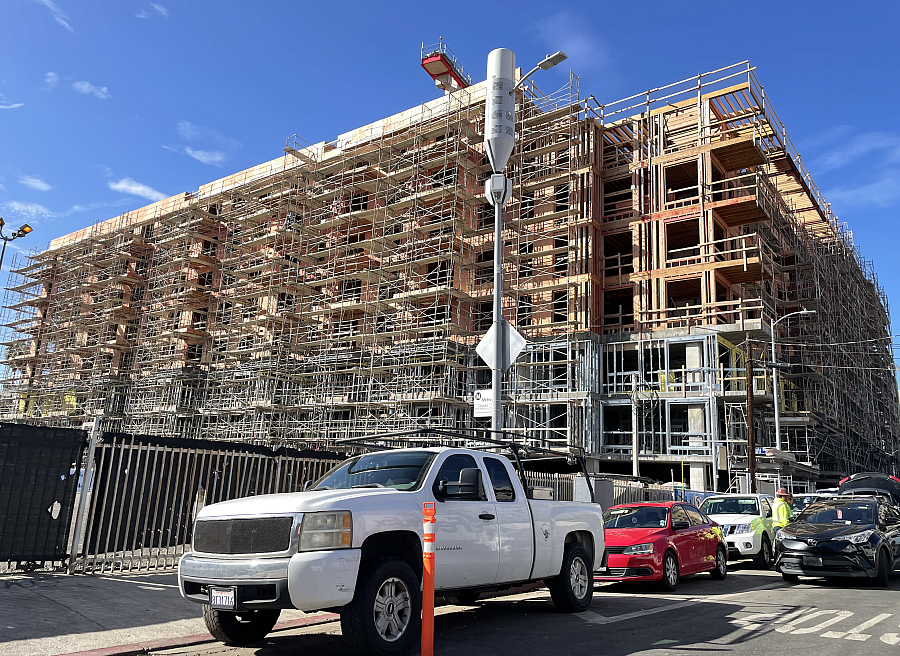Chinese Families Seeking Housing for Loved Ones with Mental Illness Hit a Brick Wall
The story was co-published with World Journal as part of the 2024 Ethnic Media Collaborative, Healing California.

Photo by Robert Alexander/Getty Images
George Zou was diagnosed with bipolar disorder at the age of 18. Soon after, his parents kicked him out of the house due to escalating family conflicts. Ever since, he has been struggling to find stable housing. Now, 32, he remains uncertain about where or when he can settle down.
As a teenager, he lived on the streets, while his classmates lived with their parents.
"At that time, I slept at the airport or on benches on campus at night, then went to school during the day ... When I couldn't sleep, I chased cars on the street and was arrested by the police multiple times ... Every day was filled with despair," Zou said.
For those living with mental disorders, having a place to live is a luxury.
Mental illnesses are common in the United States. In 2021, there were an estimated 57.8 million adults aged 18 or older in the United States with adults live with a mental illness, which represented 22.8% of all U.S. adults.
Zou was fortunate. He survived the chaos of the streets. With the help of social workers, he moved into a temporary shelter and was approved for a monthly Supplemental Security Income (SSI) of $800, which allowed him to escape the horrors of homelessness.

The bathroom shared by Zou and four others in a 1 bedroom, 1 bathroom apartment.
Courtesy George Zou
With the assistance of SSI, Zou managed to secure a shared room where he and four others were cramped into a one-bedroom, one-bathroom apartment with two people staying “in the living room, two in the bedroom, and I stayed in the dining area,” he said. The rent amounted to $570, leaving him with only $230 for food each month. The overcrowding led to conflicts with roommates from time to time, often affecting his emotional well-being and the stability of his condition, but he had no other option.
Studies have shown that housing problems impact our mental health in various ways. Living in insecure or overcrowded environments can induce stress or anxiety, either due to concerns about the living conditions or conflicts with roommates. Feeling stressed or anxious about housing can also disrupt sleep patterns, potentially exacerbating existing mental health issues or making them more challenging to manage.
In California, Challenges Have Doubled
For those with mental illness, employment and income can become unstable. In California, a fiercely competitive job market and high cost of living make the path to independent living is more challenging for those struggling with mental illness. “No matter how hard people with mental illness work, they barely scrape by, and that causes stress for people with mental illness,” Zou said.
Last year, Zou made the decision to leave behind family and friends in California and relocate to Arizona.
"Housing is a huge component of living expenses, and if you can save big on housing and allocate those savings towards other expenses, your overall quality of life improves significantly. This is particularly important for us," Zou explained.
This year, Zou relocated once again, this time to Indiana, where he meets the income limit to qualify for the coverage of the expensive medications he requires. "In Indiana, I can earn up to $102,000 and still be eligible for the coverage. But in California, the limit is $76,000.” He works as a counselor at an online university, allowing him to work remotely.
Qualifying for medication coverage is extremely important for people with mental illness because the price of such medicines is usually very high. In Zou's case, he receives an injectable medication called INVEGA TRINZA® (paliperidone palmitate) regularly. For a three-month shot, the cost is $6,222. Commercial insurance provided by employers does not cover the shot as INVEGA TRINZA® is a non-formulary drug. Without coverage, it’s impossible for him to take the medicine.
Family's Dilemma

George Zou
Courtesy George Zou
Zou was one of the lucky ones. His journey is not easily replicated. Surviving on the streets is challenging, especially for those with mental disorders. The World Journal reported stories of parents desperate to find their children after they ran away from their families or hospitals. Then with SSI, Zou managed to complete both his undergraduate and postgraduate studies at UC Irvine and Cal State LA, although it took him 10 years due to his health issues.
“In my experience, I've never seen a successful case," said Ms. Cai, a Chinese single mother who prefers anonymity to protect her son's life. Over the years, in order to save her son, who suffers from mental illness, Cai explored all kinds of resources, reaching out to the police, lawyers, mental health organizations, and attending support groups.
Cai's 36-year-old son still lives with her. Her house has been divided into two separate areas—her son’s territory includes the bedroom, bathroom, and kitchen, while the living room and garage belong to Cai. As her son resents her, they avoid seeing each other and only communicate through written notes.
Cai's son is unable to live independently, and no landlord would be willing to accept such a tenant. In order to access necessary housing resources and treatment, her son's cooperation is essential. Yet, to this day, he continues to deny his mental health issues, making him unlikely to receive help.
Cai feels that to push her son to live independently, she might have to muster the courage to evict her son from her house. However, as a mother, especially for an immigrant rooted in Chinese cultures, this is nearly impossible.
"If he were to be evicted, he would have nowhere to live, nothing to eat. He might even be killed by someone one day. I am his mother. How could I possibly leave him in danger? And even if he survived, how could he get help to get better? What if he got into trouble and ended up in prison?”
When There Is No Documentation
Research has found that a lack of stable housing has a negative impact on mental health. Homelessness and unstable housing are associated with worsening symptoms of mental illness, increased hospitalization rates, and heightened risk of violence.
Similar to Cai's situation, there is Ren Gao, in his seventies, whose son is now 49 years old. Gao and his wife have tried various methods to find a safe and stable residence for their son. They rented apartments for their son, let their son live in their new house, and even purchased a mobile home, but none of these solutions worked.
"When a person stays at home all day, doesn't drive, doesn't go out, and behaves abnormally sometimes, neighbors would easily feel scared or threatened. Then police and lawsuit come,” Gao explained.
Finally Gao found a mobile home for his son, hoping to have a peaceful life in a mostly elderly community. However, one day, the community manager approached and said: "If it's a mentally ill person with family care, it's acceptable, but annual therapy documentation is required." However, Gao's son does not acknowledge his mental issues.
Now, Gao lives in the mobile home alone, apart from his wife, who stays with their son in their house. They worry that any day a neighbor could lodge a complaint.
Every night, Gao's wife prays before bed: "Thank God for allowing us to peacefully navigate through another day."
What Is the Way Out?
“It should not be the family’s responsibility to provide housing for a family member who has a serious mental illness.” National Alliance on Mental Illness(NAMI) emphasizes, housing is critical to recovery and individuals with serious mental illnesses need options for permanent, decent, and affordable housing.
Several existing state and federal housing programs aim to provide support and accommodation for individuals with mental illness. One such program is the Section 811 Supportive Housing for Persons with Disabilities program, established by the U.S. Department of Housing and Urban Development (HUD). This initiative offers rental assistance for individuals with disabilities, to access affordable housing. The eligibility conditions state that households must be very low-income (within 50 percent of the median income for the area) with at least one adult member with a disability (such as a physical or developmental disability or chronic mental illness).
Additionally, California, like many other states, has Medicaid Home and Community-Based Services (HCBS) waivers that can fund supportive housing services for individuals with mental health conditions. These waivers enable individuals to receive assistance with housing-related expenses, such as rent and utilities, while also accessing necessary mental health supports.
Other programs, like the Shelter-Plus Care program, Section 8 Housing Choice Voucher Program provide rental assistance and supportive services targeted at homeless individuals with mental illness.
Waiting Lists
However, the waiting lists for these programs are typically very long. Zou added, "I've never known anyone to successfully get through them. And due to limited resources, waiting lists often remain closed for several years. And when they do open, they fill up instantly, so I never hold out hope for them.”

Apartment under construction in Los Angeles.
Jian Zhao, World Journal
Further, public resources are typically geared towards individuals experiencing homelessness, meaning they must first spend a long time on streets to access these services. However, living in an unstable environment is detrimental to individuals with chronic mental illness in maintaining stability or recovery.
Finally, accessing these resources often requires cooperation from applicants, including accepting relevant mental health evaluations, which can be very challenging for those who do not believe they are mentally ill.
“They are not for us.” Gao said, "There are only two ways out for those suffering from mental illness: either they deteriorate to the point of being sent to a psychiatric hospital, or they end up on the streets. “But for immigrant parents, kicking out their beloved child is cruel.
In a few cases, some individuals seem to find solutions for their desperate situations. The John Henry Center in Garden Grove, Los Angeles County, initially constructed through fundraising by patients' families, provides stable housing for individuals with mental health issues. However, it only accommodates schizophrenic patients with lower threat levels to others. Additionally, the monthly costs, amounting to thousands of dollars, make it difficult for average families to afford.
Gao mentioned that in the Chinese community, there are people planning to buy land to create a family community, to provide a relatively safe and familiar environment for their family members with mental issues to live in.
As for board and care homes for people with mental illness, admission usually requires transferring guardianship to the caregiver, to ensure these special residents adhere to their medication regimen. In instances where individuals deny their mental health conditions, transferring guardianship becomes challenging.
"Even now, I still often wake up from sleep, startled, drenched in cold sweat, asking why there's still no solution..." Gao said.

This project is supported by the USC Annenberg Center for Health Journalism, and is part of “Healing California,” a yearlong reporting Ethnic Media Collaborative venture with print, online and broadcast outlets across California.

